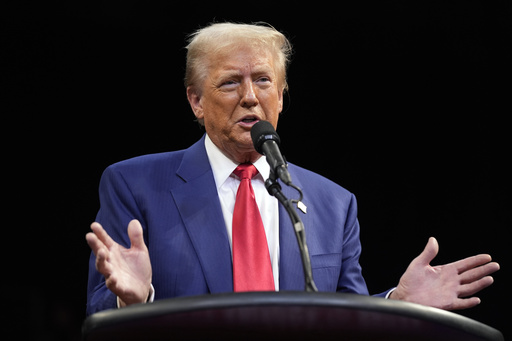
WASHINGTON — A year that started with expectations of a significant court showdown for Donald Trump will end without a definitive trial outcome, leaving voters in limbo regarding two of the most significant legal challenges confronting the Republican presidential nominee.
These cases—one alleging that Trump illegally retained classified documents and another accusing him of attempting to overturn the results of the 2020 election—remain influential as the upcoming election approaches. The outcome not only holds implications for Trump’s political future but also raises questions about his personal freedom as he confronts extensive legal battles.
Examining the reasons neither case reached a trial in the past year reveals much about the complexities involved.
In the case concerning classified documents, the indictment presented alarming allegations, suggesting Trump casually displayed sensitive materials, including a Pentagon “plan of attack,” and solicited assistance from aides and attorneys to conceal documents that investigators demanded.
Prosecutors emphasized the serious national security risks involved, particularly as documents concerning nuclear capabilities were discovered in a disorganized manner at Trump’s Mar-a-Lago estate, even in places like his bathroom.
The evidence appeared compelling in nature; there were audio recordings of Trump acknowledging the classification of a document, along with surveillance footage showing boxes of documents being removed from a storage area at Mar-a-Lago, and testimony from a Trump attorney that implicated the former president in efforts to mislead the FBI.
These elements contributed to a widespread belief that the classified documents case was the most legally dangerous of the four criminal actions Trump faced throughout the year.
The situation was complicated further by the assignment of a skeptical judge, Aileen Cannon, chosen for the case shortly before the indictment was made public. Cannon, appointed by Trump and lacking significant trial experience, was based in Fort Pierce, quite distant from the active federal court scene in Miami.
Her previous rulings had already caused friction with the Justice Department, particularly when she approved Trump’s request for an independent review of the materials seized by the FBI—a decision later overturned by a federal appeals panel.
Cannon’s oversight of the case then drew additional scrutiny as she allowed defense motions to accumulate, leading to substantial delays and deemed some arguments from Trump’s defense team as unworthy of serious consideration. She indefinitely postponed the trial in May, days before it was set to open, and later entertained hearings about the legitimacy of special counsel Jack Smith’s appointment, resulting in her controversial move to dismiss the case based on those hearings.
As for the Capitol riot, Trump’s alleged attempts to maintain his grip on power had been well-documented before he faced charges. Prosecutors detailed Trump’s attempts to sway Vice President Mike Pence into rejecting the certification of electoral votes, illustrating his broader schemes.
The indictment benefited from cooperation among close aides and other officials involved in Trump’s campaign of influence. Although Trump sought to prevent Pence from testifying through claims of executive privilege, a federal court ruling mandated Pence’s testimony, which provided vital details for the case.
While the classified documents case seemed straightforward in legal terms, the election interference charge was far more complicated due to its context within Trump’s actions while in office.
The trial court and federal appeals court initially dismissed Trump’s claims of immunity from prosecution. However, the Supreme Court’s ruling diverged sharply from this position, agreeing to hear the case and expressing skepticism toward the charges faced by Trump, even while not entirely accepting his arguments of absolute immunity.
In a significant 6-3 ruling, the Supreme Court determined that former presidents enjoy broad immunity for actions performed within their constitutional duties, while also being presumptively immune for other official acts. Justice Roberts, writing for the majority, indicated these assertions could limit certain charges against Trump, leaving the decision to trial court Judge Tanya Chutkan regarding which acts still constituted prosecutable offenses.
Looking forward, Smith’s team is appealing Cannon’s dismissal of the case to the 11th U.S. Circuit Court of Appeals. The timeline for a ruling remains uncertain, but prosecutors have warned that Cannon’s ruling may disrupt established precedents regarding the appointment of special counsels and pose risks to the operational integrity of the Justice Department.
If the appeals court overturns Cannon’s decision, it will then decide whether to assign the case to another judge. Meanwhile, proceedings regarding the election interference case continue following the Supreme Court’s ruling, though a trial before the impending election seems unlikely. If Trump were to win the election, the dismissal of the case could potentially remain a possibility, further complicating the landscape.
